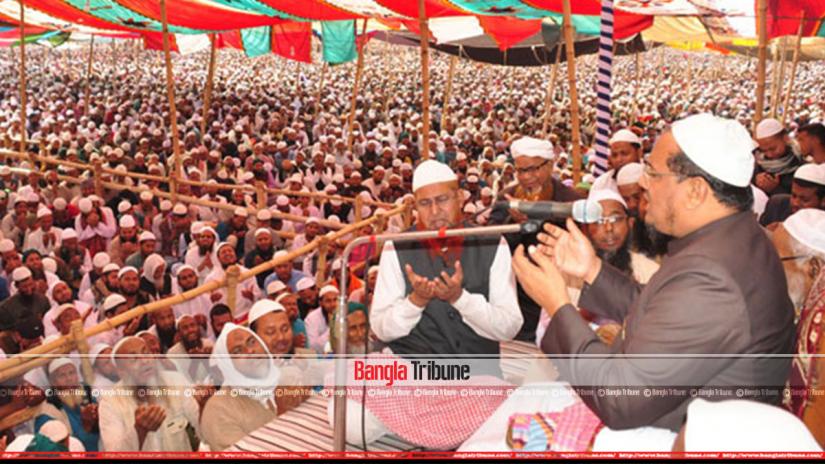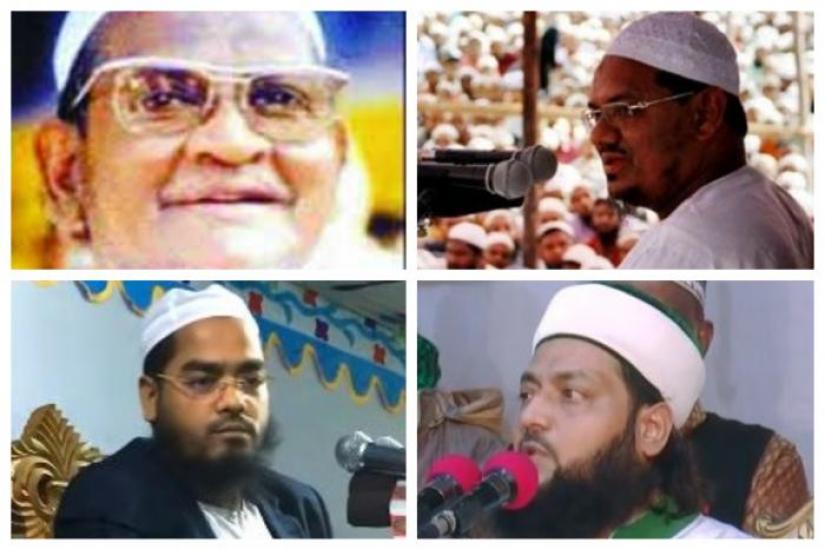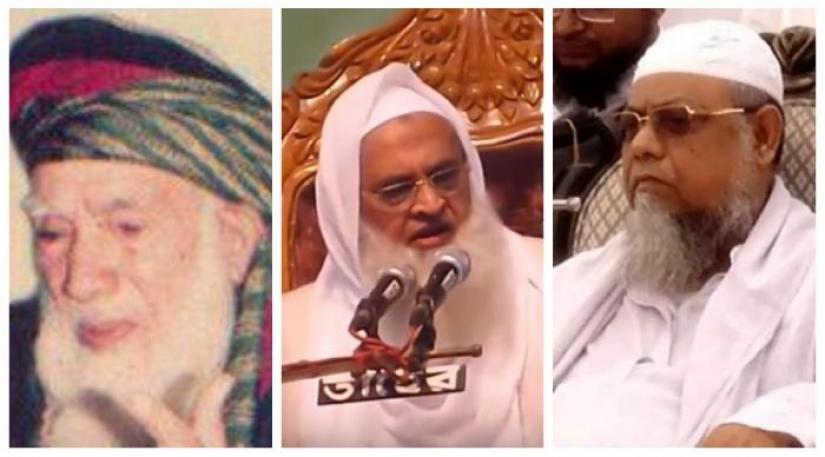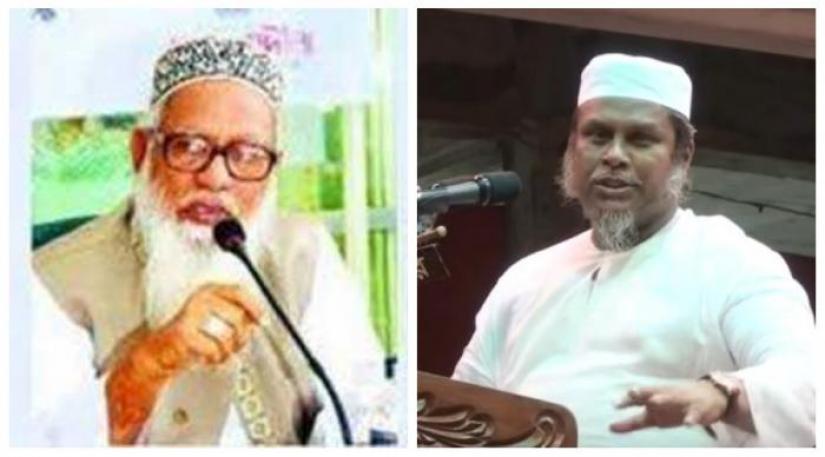 It is hard to live in Bangladesh and not be familiar with the elaborate events that Waaz Mehfis are. With loud sermons, often musical in nature and glitzy decorations, one couldn’t miss it even if they wanted. Although all of them might look and sound the same to people, these mehfils are unique in their own ways depending on which religious faction has organized them.
It is hard to live in Bangladesh and not be familiar with the elaborate events that Waaz Mehfis are. With loud sermons, often musical in nature and glitzy decorations, one couldn’t miss it even if they wanted. Although all of them might look and sound the same to people, these mehfils are unique in their own ways depending on which religious faction has organized them.
Islamic scholars are of the view that the nature of these gatherings largely depend on the faith, way of following religion, ideologies, politics and funding from the Middle East.
They say that there are primarily five sects of Islam in Bangladesh and they each have, in their own ways, influenced respective Waaz Mehfils. Moreover, the Kawmi’s, Maza-Khanka and Salafi followers are also divided into several sects.
Mufti Lutfor Rahman who is a senior teacher at the capital’s Azimpur Faizul Ulum Madrasa said that these sects differ in terms of following certain rituals as well but it’s difficult for outsiders to identify these differences.
“The Ulemaye Deoband faction follows the Kawmi way and they are the largest sect,” he told Bangla Tribune.
“There is a faction that is made up of madrasa centred scholars and another is mazar-orosh centred. Then you have the fourth faction which is the pro-Jamaat-e-Islami. The fifth is known as Ahle Hadis or Salafis,” he added.
He said that many, however, say that the Salafis “don’t follow the religion.”
Meanwhile, Islamic Foundation Project Director Dr Shah Syed Imran says that there are four types of followers of Ilm-e-Tasawwuf or Sufism in the country.
“The Pirs [title for a Sufi master or spiritual guide] follow them,” he said.
“The four factions are-Hazrat Abdul Quader Zilani’s Quaderia, Hazrat Khaza Moinuddin Chishti’s Chishtia, Mujadded Alfe Suny’s Mujaddedia and Hazrat Bahauddin Nakshebandi’s Naksbandia,” he added. Qawmi or Deobandi faction:
Qawmi or Deobandi faction:
The Qawmi or Deobandis are basically a Sunni faction and have three groups of followers. The first group, known as ‘Ulemaya Deoband’ have the most followers.
The followers if this group are concerned with religious discussions on matters of aqidah [Islamic matters which are believed in, with certainty and conviction], Towheed [attributing Oneness to Allaah] and the negative attributes of bid’ah [innovations].
The second group is the followers of Pirs who acquire knowledge from them. The most popular of this groups is the pro-Chormonai.
As a matter of fact, the pirs and followers of Chormonais have formed the political party Islami Andolan.
The party itself has its own affiliate oragnisation, the Mujahid Committee that organizes the most number of Waaz Mehfils throughout the year. The top brass of the party carry out the responsibilities of the committee.
Islami Andolan started its journey on Mar 3, 1987 in Dhaka. It became active in the political arena in 1991 with the leadership of late Pir Fazlul Karim.
Although Mowlana Delwar Hossain Syedi, now serving time for crimes against humanity in the 1971 Liberation War, was involved with the party, he stepped out and joined Jamaat even before the party went public.
The third group amongst the Qawmi’s has formed the organisation ‘Dawatul Huq’ led by Jatrabari Madrasa Director General Mowlana Mahmudul Hassa.
This particular group follows “strict” religious guidelines while organising Waaz Mehfils and refrain from adding anything “extra” to it.
The scholars of this faction say that ‘Dawatul Huq’ formed around the ideals of India’s Mowlana Ashraf Ali Thanvi. It then spread to Bangladesh and Pakistan through late Mowlana Abrarul Hoque.
Scholars say that the guideline included not blocking the roads for gatherings and holding them in mosques or madrasas or mosque only, setting up megaphones in limited areas, not holding mehfils too late into the night, not accepting payment for sermons.
In addition to that, they also ban arranging for food without permission, chanting slogans at the speaker’s arrival and lighting up their venues.
Aliya Madrasa-centric faction:
This particular faction is centred around the government and non-government Aliya Madrasas throughout the country.
The most notable scholars of this faction are Baitul Mokarram Khatib Mowlana Salauddin, late Mowlana Jalaluddin Al Quadri and Dr Kafil Uddin Sarker. Speakers who follow ideals of these factions are mostly invited to preach at events of the Sunni sect.
Speakers who follow ideals of these factions are mostly invited to preach at events of the Sunni sect.
Islamic Foundation Bangladesh employee Dr Syed Emran says that there isn’t much difference in the views of Qawmi and Aliya scholars. Both of these factions follow the Sunni sect but their views differ when it comes to matters such as Eid-e-Miladunnabi and other matters regarding prayers.
These differences have been there for the last 40 years and in some regions such as Sylhet, Brahmanbaria, Netrakona, Mymensingh and Cumilla debate programs between Qawmi and Aliya scholars are quite popular.
Mazar-sharif-centred faction:
A Mazar is a shrine of a notable religious leader and the pro-Mazar sharif and Orosh factions usually include singing and dancing in their Waaz Mehfils.
Their mehfils are usually centred around Chattogram’s Maizbhandari Darbar Sharif, Atrashi Darbar Sharif, Dewanbagi Darbar Sharif and Shahjalal Darbar Sharif.
Many speakers of this faction have gleaned much popularity but the pro-Qawmi scholars often criticise terming their ways as bi’dah or innovation.
“Islam came to the subcontinent through the Sufis,” said former lawmaker and member of a mazar committee MA Awal.
He said that the various darbars and khankas that they established preached Islam as a peaceful religion. Pro-Jamaat-e-Islami faction:
Pro-Jamaat-e-Islami faction:
The Jamaat-e-Islami, a well known political party, inspired its own Waaz Mehfil factions pioneered by Mowlana Delwar Hossain Syedi, who has been convicted of crimes against humanity in Bangladesh’s 1971 War of Independence.
Although the Jamaat faction started its journey with Syedi, it was Mowlana Kamaluddin who kept it going.
In the mehfils of this faction the speakers preach Islam from the viewpoint of Pakistan’s Abul Ala Moudud.
An Islamic Foundation official wishing to remain anonymous said that leaders of the party attend these mehfils and are paid quite well.
“Mowlana Syedi became popular in the eighties with Waaz Mehfils,” he said and added that he started getting cozy with the political party somewhere in 1987.
He added that 2 to 4 days tafseer mehfils started in the country centering him.
The Salafi faction:
The Salafi adherents follow the path of the Salafs or “the pious predecessors” often taken to be the first three generations of Muslims.
This includes the generations of Prophet Muhammad and his companions (the Sahabah), their successors and the successors of the successors.
The Slafis also termed as Wahabis by critiques claim to emulate the Salafs as closely and in as many spheres of life as possible.
This faction entered the Bangladeshi Waaz Mehfil world around nine years ago but many scholars term them as “those who don’t follow the religion.”
A group of scholars and professors work to spread the Salafi viewpoint and this faction in turn has sixteen separate groups of followers, a source in the Bangladeshi mission in an influential Middle Eastern country said.
Bangladeshi scholars on the other hand believe that this sect has only six factions.
Several scholars claim that the Salafis are funded by the Middle East where they are the most popular.
They say that they have their own mosques in Dhaka and are practicing their views in the mosques that they are building in Tangail.
People familiar with the matter say that there are 16 factions of the sects- some district based and some Dhaka based. They say that some groups are even comprised of two or three members.
In an interview with the Washington Post, Saudi Arabia’s Crown Prince and de facto leader Mohammad Bin Salman said that during the Cold War Saudi Arabia funded the spread of ‘Wahabi views’ in muslim countries to fight the Soviet Union.
Also read


